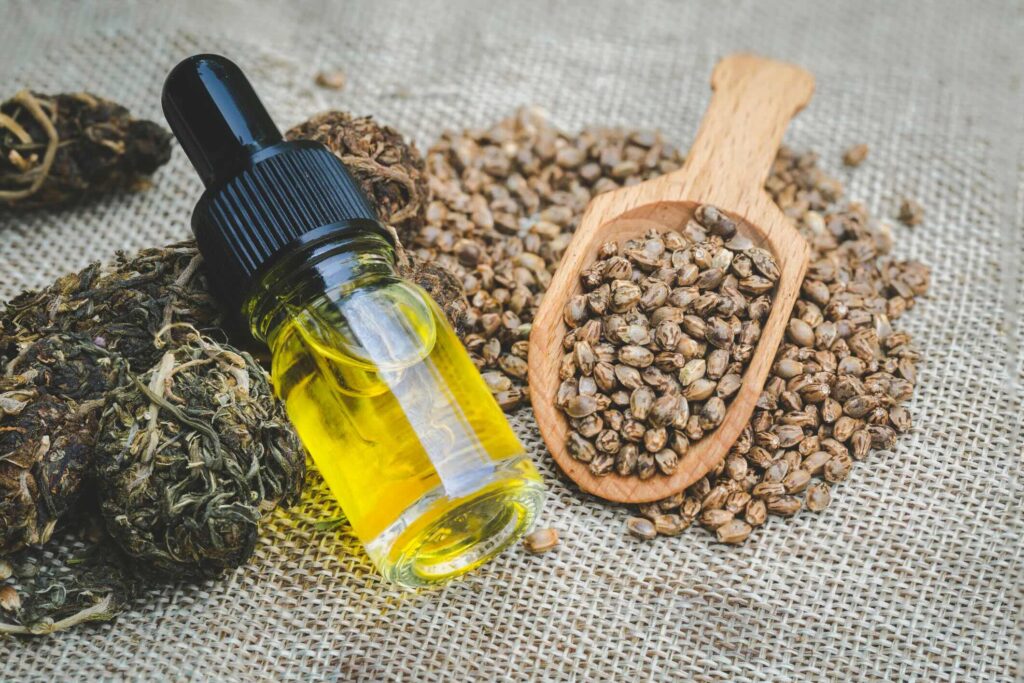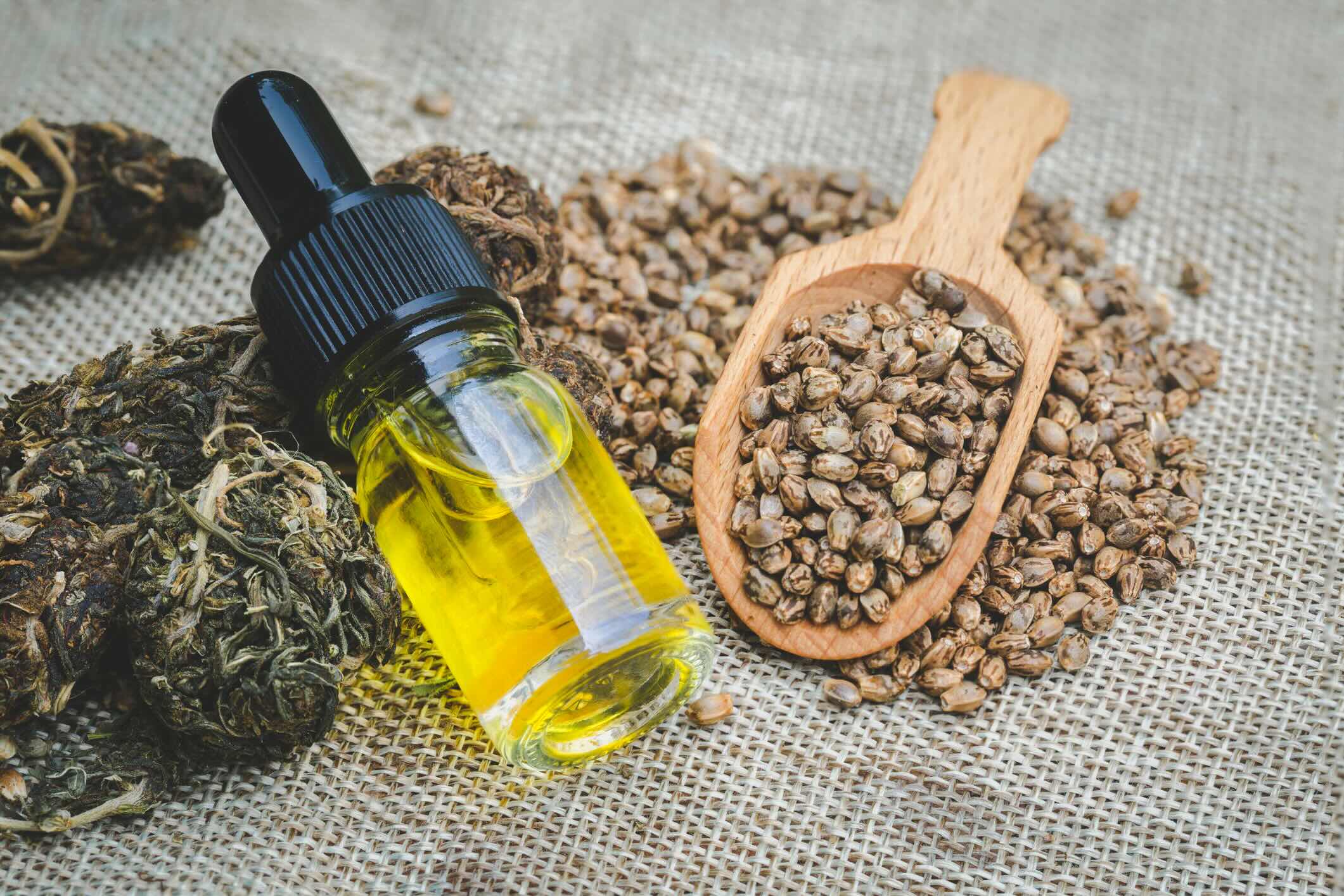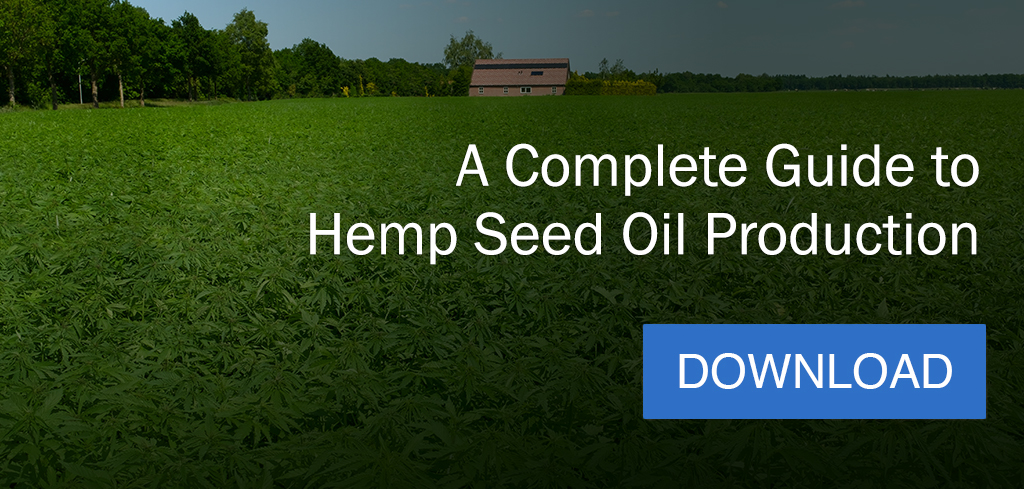
When it comes to Cannabis sativa, the difference between a federally-scheduled drug and a valuable commodity can be as minor as a few tenths of a percentage. Although hemp seed oil and cannabidiol (CBD) oil are both derived from the same Cannabis plant and are often both referred to as “hemp oil,” they’re not the same at all. In fact, each product has very different chemical compositions, applications, and legal ramifications, so understanding the difference between hemp oil vs CBD oil can make or break a hemp processing operation.
In this blog, we’ll explore the differences between hemp seed oil and other hemp extractions. But first, let’s explore how the controversy around cannabis first began and why we must make such a critical distinction between regulated and unregulated hemp crops.
History of cannabis regulations
Cannabis plants have been used for thousands of years for food, fun, fiber, fuel, and more, dating back as early as 8000 B.C. As this versatile crop spread across the globe, civilizations uncovered new uses for nearly every part of the plant—making ropes, canvas, and paper from its strong fibers and squeezing oil from its seeds to make medicinal tinctures. In fact, during the Middle Ages in England and the later colonization of New England, early laws required farmers to grow hemp because of its limitless potential.
Then, in 1937, the U.S. Congress passed the Marihuana Tax Act, restricting commercial production of the cannabis plant. Some historians claim that this landmark legislation was backed by wealthy businessmen like newspaper publisher William Randolph Hearst, who wanted to protect his timber holdings against the threat of hemp paper, and Andrew Mellon, who similarly wanted to protect his investment in a new synthetic material called nylon, which hemp fiber also threatened to replace.
America briefly relegalized hemp production during World War II, when Japan cut off jute imports from the Philippines, to provide a domestic source of fiber to make uniforms, ropes, and canvas. But after the war, U.S. production sharply declined as imports resumed and legal restrictions returned.
As the post-war counterculture embraced cannabis for its psychoactive effects, the government ramped up prohibition again in 1970 with the Controlled Substances Act, which listed “marihuana” as a Schedule 1 narcotic. Meanwhile, scientific research uncovered the specific compounds in the cannabis plant responsible for its intoxicating high—eventually leading to the pivotal distinction between hemp and cannabis.
The difference between hemp and cannabis
Researchers identified hundreds of biologically active compounds in cannabis, including more than 120 cannabinoids, which bind to certain receptors in the body involved in the regulation of pain, mood, appetite, and inflammation—creating a spectrum of therapeutic possibilities.
The most abundant cannabinoid in the plant is delta-9 tetrahydrocannabinol (THC), the compound responsible for the “high” associated with psychoactive cannabis. The second most prevalent cannabinoid is cannabidiol (CBD), which is a non-intoxicating compound with other benefits like anxiolytic, anticonvulsant, and anti-inflammatory properties.
Different cultivars of cannabis contain varying levels of THC, CBD, and other cannabinoids. Over time, legal definitions began to differentiate between drug-type cannabis strains high in THC, which are classified as psychoactive cannabis, and non-drug strains with low levels of THC, which are categorized as industrial hemp, or non-psychoactive cannabis. Hemp is legally defined as the Cannabis sativa plant—referring to any part of the plant containing less than 0.3% THC on a dry weight basis. The plants are otherwise indistinguishable.
The U.S. Agriculture Improvement Act of 2014 (known as the 2014 Farm Bill) reintroduced hemp to American soil by allowing state agriculture departments to administer pilot production programs. Then, the Agriculture Improvement Act of 2018 (the 2018 Farm Bill) fully legalized U.S. hemp production—removing it from the federal list of Controlled Substances and making it a regulated commodity. Psychoactive cannabis remains federally illegal, although 24 states have legalized recreational use and 38 currently allow medical use.
Hemp oil vs CBD oil
Hemp seed oil and CBD extract both come from the cannabis plant, but that’s where the similarities between hemp oil vs CBD oil end. Hemp seed oil is extracted from the hemp plant’s seeds, just like other seed oils pressed from sunflower seeds or canola. Since hemp seeds don’t contain cannabinoids, this type of hemp oil is not intoxicating—although it does provide plenty of other functional benefits, thanks to its healthy balance of polyunsaturated omega-6 and omega-3 fatty acids.
Hemp extraction may also refer to an entirely different process of extracting cannabinoids and other bioactive compounds from the flowers, leaves, and biomass material of the cannabis plant. CBD oil can be extracted from either hemp or psychoactive cannabis. However, only hemp-derived CBD from plants containing less than 0.3% THC is considered legal under the 2018 Farm Bill; CBD from THC-rich cannabis plants is still classified as a controlled substance.
Several methods of hemp biomass extraction exist, depending on which cannabinoid is being extracted and what form the final product will take. Common solvents used in CBD extraction include ethanol, carbon dioxide, hydrocarbons like butane and propane, and even edible oils like coconut oil. Mechanical methods include water or ice-based separation, as well as grinders, sieves, and presses that squeeze cannabinoid-rich oil from the plant biomass. These concentrates are refined into various consistencies ranging from oil to a sticky tarlike substance to crystals, crumbles, or creamy “budder.”
While CBD oil holds therapeutic potential as a pharmaceutical ingredient used to treat everything from anxiety to epilepsy, pain, and eczema, hemp seed oil is gaining popularity across a wide variety of applications. From salad dressings and milk substitutes to lotions, lip balms, and industrial products like lubricants, paints, and plastics, hemp seed oil continues to prove its versatility.
Hemp seed oil extraction
Because of the regulatory complexities surrounding cannabis, hemp seed processors must take precautions when handling this plant. For example, thoroughly cleaning hemp seeds before pressing is imperative because the presence of plant material could alter the chemical composition of the oil—potentially introducing cannabinoids like CBD or THC.
Hemp seeds are most often cold pressed, meaning whole raw seeds are dried to about 5% moisture and then fed directly into an expeller press that uses mechanical pressure to crush the oil from the seeds. Cold pressing yields the purest “virgin” seed oil possible—without adding any extra heat that could degrade the quality of the fats or proteins in the seed.
However, since the seeds have not been cooked or conditioned to free the oil before cold pressing, the screw press has to work harder to release the oil using pressure alone. Some processors run multiple presses or multiple passes through the same press, which can add overhead costs. A more efficient alternative, the Anderson Super Duo Expeller uses a unique dual-press design to crush the seeds twice in a single pass, making it ideal for cold pressing. This method extracts the highest quality oil but leaves 10-14% residual oil behind.
Processors can cook the hemp seeds before expeller pressing to improve oil recovery rates. This added heat treatment ruptures the cell walls to release the oil so it flows more freely. This mechanical pressing process can reduce residual oils to about 6%.
Optimizing hemp oil extraction
As a recently legalized industry still in its infancy, hemp remains surrounded by uncertainty. Ever-changing regulations and underdeveloped supply chains can cause wild price swings and other issues as the market finds its footing. Following decades of confusion between hemp and psychoactive cannabis and hemp oil vs CBD oil, it’s increasingly important for processors to understand the differences, challenges, and opportunities in this emerging space.
While newly legalized cannabis markets continue to expand and explore the potential of hemp oil and other byproducts, processors can stand out in this space by finding ways to extract high-quality hemp seed oil more efficiently.
Anderson International understands the ins and outs of hemp seed oil extraction, with decades of experience guiding specialty oilseed processors through global market fluctuations. Anderson can provide the expertise and equipment processors need to tap into hemp seed’s full potential.

